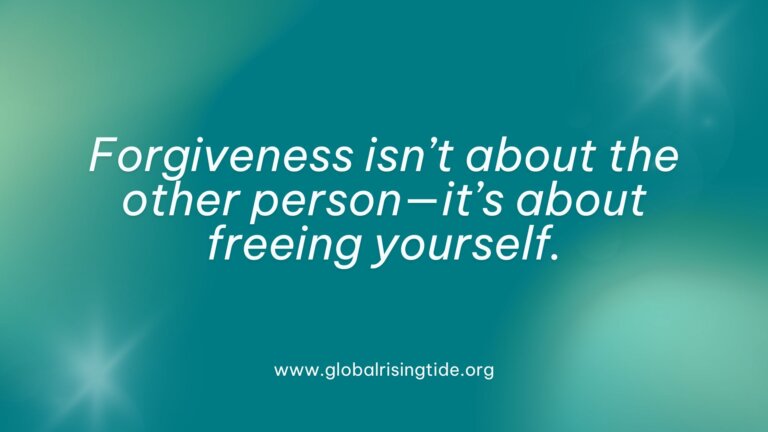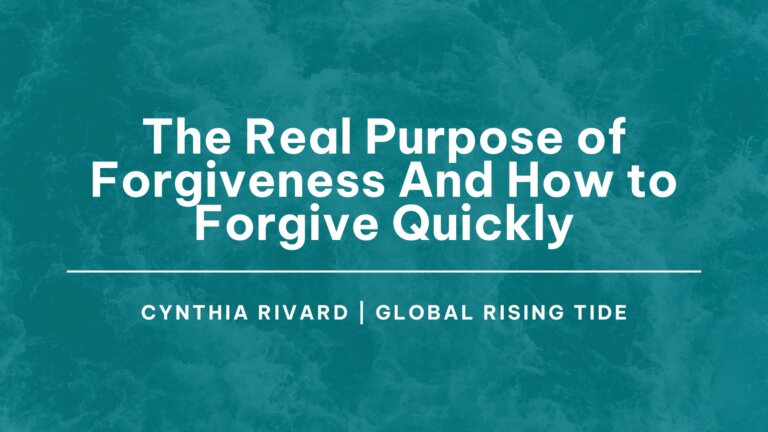When you hear about the attribute of forgiveness, it is often framed as an enviable trait and a loving or noble act of compassion toward a person who hurt you or did something you believe should never have happened. And although it can involve all of those things, that has nothing to do with the benefits of forgiveness and why you want to let go of anger or resentment toward anyone, including yourself.
When you contemplate a need to forgive, it is helpful to remember that it has nothing to do with the other person. It is all about you.
Whether you find yourself needing to forgive someone else, yourself, or Divinity, the real reason to forgive is because holding on to that pain is weighing you down. Carrying emotional baggage does not hurt the other person—it makes you feed heavier and holds you back from living your best life.
The really good news is that you do not need to have a conversation with the person you are forgiving. You do not even have to consciously say, “I forgive you” or ever speak to them again.
When you forgive someone, the benefit comes from letting go.
We have memory so that we are able to learn any lessons needed from experience, and then incorporate those lessons as we move forward. That is all those memories are meant to do. When you are caught up in anger or resentment, you are stuck in the past and there is no benefit from living there – other than learning from it and using those lessons to inform our decisions moving forward.
Forgiveness Starts with You
Believe it or not, the person most of us need to forgive is ourselves. We are often harder on ourselves than anyone else ever could be. We replay past mistakes, poor decisions, or moments we wish we could erase. We tend to forget that we cannot be perfect and making mistakes are a part of our human experience. It is a primary way that we learn.
Memory is not designed to be a punishment. It is our teacher. You are meant to learn from your past, not be imprisoned by it. Every misstep offers a lesson—when you allow it to—and forgiveness is what frees you to move on.
Letting go does not mean pretending something did not happen or that it was actually a “good” circumstance. All it entails is choosing not to allow that memory to have power over you anymore.
Let Go Without Rehashing
There is a common belief, especially in therapeutic or counseling circles, that you need to “unpack” what happened—dive deep into the why, analyze every detail, and relive it so that you can acknowledge what happened and the pain it caused you.
This is a misguided, old school philosophy that can cause more damage than good. If you have had a positive experience from counseling or therapy, that is wonderful; but you are one of the few. Digging up old pain can feel like rubbing salt in the wound and does nothing to help you move forward.
What you actually need to do is release your attachment to the event. What happened, is in the past
Your job now is to enjoy your present, which is all we ever have; and to make plans and move toward a more desirable future, because that is the only time we have any influence over circumstances.

Your Power Is in the Present
Forgiveness is the act of stopping the story. It involves choosing not to let past pain and presumed slights dictate your future joy. When you hold on to resentment, you are staying focused on the rearview mirror; and there is no joy there. Even when you reflect on pleasant memories it will be bittersweet because they are in the past. Your life is happening now. And everything you will be able to create lies ahead.
Now is the time to let go of your painful stories about the past. Forgive yourself. Forgive anyone else involved. Forgive God for “allowing it to happen.”
And do not do it for them. Do it for yourself. You deserve peace and happiness now.


